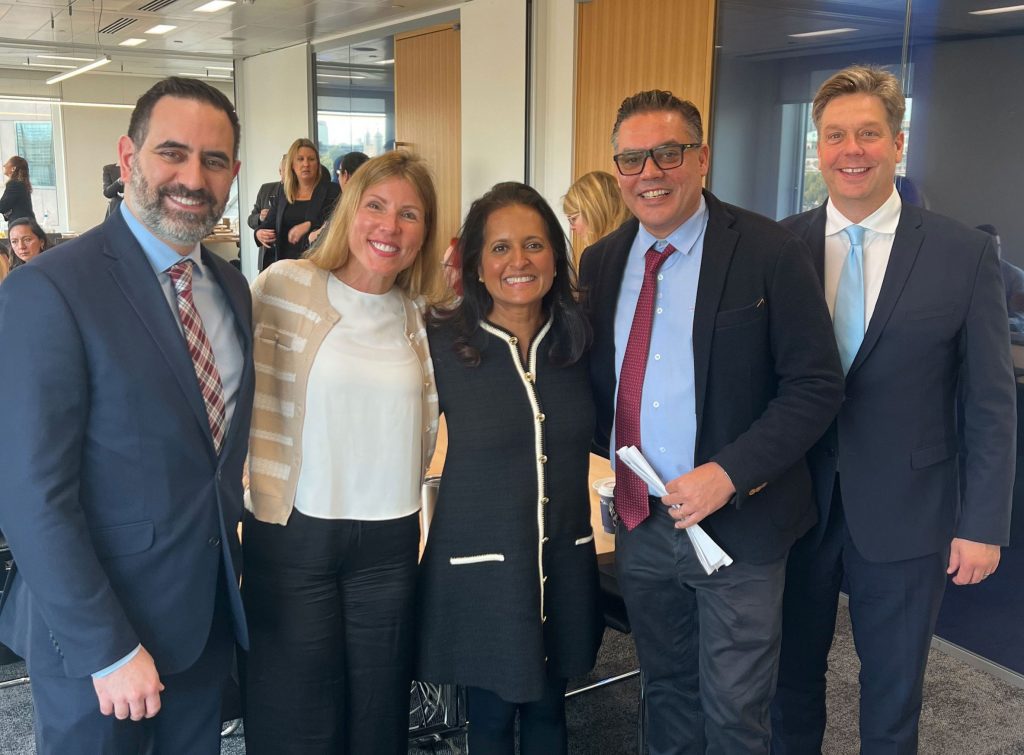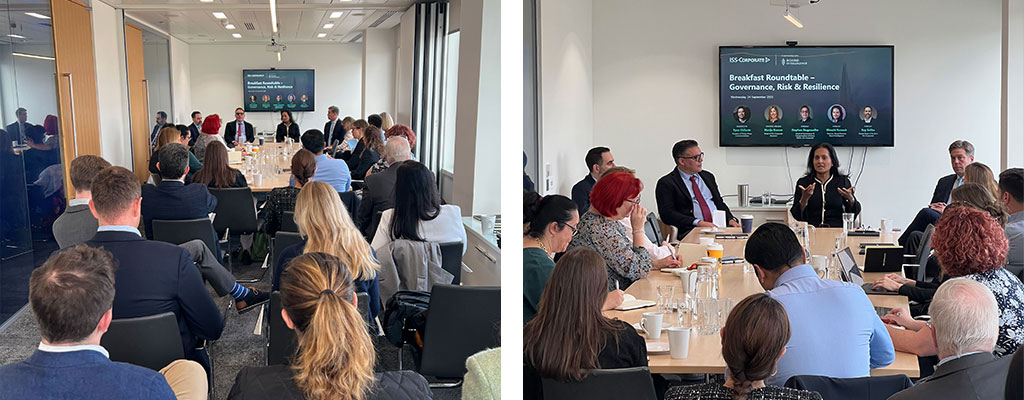Governance, Risk & Resilience: Key Takeaways from London

We’re very pleased with the results of our wide-ranging roundtable discussion on Governance, Risk & Resilience held in London on Sept. 24 and led by our own Stephan Stegmueller, Head of Governance and Compensation Advisory EMEA, Roy Saliba, Global Head of Product, and Board Intelligence’s Dineshi Ramesh, Director of the Board Review Practice. It was a great opportunity to unpack and debate the crucial challenges facing U.K. companies and their board members. We’d like to share with you a few key takeaways from the event.

Executive Compensation: Fear of Poaching Drives Push for U.S.-Style Incentive-Based Pay
Companies in the U.K. (and countries including Germany and the Netherlands) are regularly contending with recruiting efforts by better-paying U.S. firms for their top executive talent, especially in the high-tech space. About two thirds of S&P 500 companies provide time-based awards in their long-term incentive programs and that tends to result in much higher total compensation than more salary-based London Stock Exchange companies can provide (ISS-Corporate, Compass platform data). U.K. businesses have started to push back by proposing more U.S. style compensation plans for some executives, even though these efforts tend to be controversial in Britain, which has a long tradition of limiting the gap between worker and executive pay. If U.K. companies are successful in securing U.S. style compensation, a key question is whether those executives will deliver enough shareholder value to justify their higher pay.
Upskilling in Focus as Board Members Confront More Complex Issues
There was broad agreement that board members, especially non-executive directors, are required to have ever more complex skillsets to address emerging issues such as cybersecurity, AI, evolving sustainability reporting requirements and more. There was a lively debate over the best way to better equip board members to identify and address specific risk factors that are relevant to their companies. One approach is to bring in new directors who already possess these important skillsets, which was seen as effective but potentially costly given the competition for skilled directors. Companies may instead choose to offer training to existing NEDs or rely more on specialist advisors to better understand the risks and opportunities.

Cybersecurity is a Board Level Issue, But Still Isn’t Always Treated As One
Cybersecurity has evolved from an IT security issue to a board-level concern, and not just for tech-focused companies. There are signs that many companies are still not giving the issue the necessary level of attention and expertise, as high profile attacks resulting in multi-million-dollar losses mount. More and more boards have at least one member with cybersecurity expertise, but three or more may be required to properly understand the risks and formulate an effective defensive strategy. As with other highly skilled directors, bulking up a board with more cybersecurity experts may be very expensive.
Further insights into this issue are available in ISS-Corporate’s recently published U.K. 2025 AGM Season Review report. It includes data on the percentage of FTSE 350 companies with at least one director with information security skills, broken down by industry. The report also details other key trends observed during the AGM season, such as findings related to executive compensation, director elections, and diversity.
Sustainability Expertise Also Key for Assessing and Addressing Risk
Deep knowledge of sustainability issues can be just as important as being cyber savvy. Many boards are broadly aware of potential environmental risks, but often not to the extent that they can properly break down extensive and complicated data to identify and quantify the risks (and opportunities) that are most relevant to their business and develop an effective strategy of dealing with them.
Regulation, Guidance Developments Add to Growing List of Board Responsibilities
With the corporate governance code update coming into effect in 2025, the overarching theme in that is more controls, more leaning into risk management, more explicit comply-and-explain types of communication. At the same time, the ongoing changes to EU sustainability reporting rules were a significant governance theme for this year, even for many U.K. companies. Navigating the continuing uncertainty over the extent of the EU rule changes presents an ongoing challenge for companies.
Zoom In, Zoom Out
In an increasingly complex environment, companies need to think more about risks and challenges in ways that cut across the entire organisation. Firms can be overly siloed today, and that can create barriers to dealing with issues in a holistic way. One suggestion was a “zoom in-zoom out” approach, where companies first conduct a deep dive into a specific issue of concern and then, before taking action, zoom out, to understand the issue in the context of the entire organisation. Ideally, it was suggested boards should have fewer, but deeper, conversations about the issues that matter the most.
Don’t Forget About the Core Mission: Creating Value
As directors navigate increasing governance burdens, there is a risk that they lose sight of their core mission of creating long term value for shareholders. A research report by Board Intelligence found that nearly half of directors (about 46%) didn’t believe that their own boards were adding sufficient value to the companies they served. Handling a growing and complex list of governance issues is important, but organic growth in particular needs to be front and center in board conversations.
Summary & Outlook
The discussions at our recent roundtable revealed a clear picture: U.K. companies and their boards are navigating an increasingly complex landscape of challenges – from executive compensation pressures and rapidly evolving risk profiles to heightened regulatory scrutiny and the demand for specialized expertise. Successfully addressing these issues requires a proactive, holistic approach, a commitment to continuous upskilling, and, crucially, a steadfast focus on delivering long-term shareholder value. The insights shared highlighted the need to move beyond simply ticking boxes on compliance and toward genuinely strengthening governance, risk management, and resilience.
We believe these conversations are just the beginning. To continue this vital dialogue and explore how ISS-Corporate and Board Intelligence can specifically support your organisation in navigating these complexities, please get in touch.
New Approach to SEC Rule 14a-8: What It Means for Companies
Governance, Risk & Resilience: Key Takeaways from London
Overstaying Their Welcome? A Close Look at Independent Directors Tenure in Hong Kong
Too Many Hats: Hong Kong Companies Pressed to Cut Down on “Overboarding”
FTSE 350: Board, Committee Chair Shareholder Support Can Signal Governance Concerns
2025 U.S. Proxy Season: Midseason Review Finds Sharp Drop in Shareholder Resolutions on Ballot
DExit: Signs of Discontent in Biggest Corporate Domicile?
The Evolving Landscape of Workplace Mental Health Management
Corporate Political Activity Disclosures: A Continued Priority for Investors and Companies
Governance QualityScore as an Indicator of Risk and Investor Sentiment

